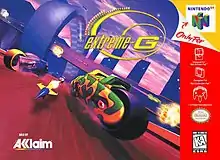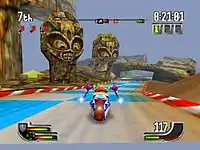Extreme-G
Extreme-G is a futuristic racing video game developed by Probe Entertainment and published by Acclaim Entertainment, featuring an original trance soundtrack. It was released for the Nintendo 64 in 1997, and was ported to Japan for release on May 29, 1998.[1] Despite the crowded field of Nintendo 64 racing games, Extreme-G was met with moderately positive reviews and was a commercial success. A sequel, Extreme-G 2, was released in 1998.
| Extreme-G | |
|---|---|
 | |
| Developer(s) | Probe Entertainment |
| Publisher(s) | Acclaim Entertainment |
| Composer(s) | Simon Robertson |
| Series | Extreme-G |
| Platform(s) | Nintendo 64 |
| Release | |
| Genre(s) | Racing |
| Mode(s) | Single-player, multiplayer |
Gameplay

The gameplay of Extreme-G consists mainly of fast-paced racing through an array of futuristic environments. An array of defensive and offensive weapons are available on-track.[2] These include multi-homing/reverse missiles, magnetic/laser mines, and shield-boosting power-ups. Special weapons can also be found such as invisibility, phosphorus flash and the mighty Wally-Warp which if not avoided, can instantly transport a bike right to the back of the pack.
As with all Extreme-G games, futuristic racing pilots race plasma-powered bikes in an intergalactic Grand Prix at speeds over 750 km/h. The emphasis is on speed and racetrack design, with tracks looping through like roller coasters.
At the beginning of each round, the player is given three "nitro" powerups which provide a temporary speed boost (these powerups cannot be replenished). Also, falling off cliffs or, in some cases, the track itself results in simply losing time rather than losing 'lives'; bikes are teleported back to the track and must rebuild their speed and lost time from a dead standstill.
The single player games come in three difficulty settings: Novice, Intermediate and Extreme. The main game mode (Extreme Contest) features three championships: Atomic (four tracks), Critical Mass (eight tracks) and Meltdown (full 12 standard tracks). The player must come first in each championship to progress. Winning championships on the various difficulty levels will open up the hidden bikes, levels and cheats. Once the levels have been opened they can be used for the additional single and multi-player modes.
The multi-player modes include competitive racing, flag capture, and battle mode.[3]
Plot
Extreme-G is set in the distant future where Earth is reduced into a wasteland. From their new-found planet the human colonists watch their remote controlled bikes wreak havoc through their ancient cities and fight their way to determine which racer manages to qualify.
Development
Extreme-G was developed under the working title "Ultimate Racer".[4] It was created by Probe Entertainment, an internal development team of Acclaim Entertainment.[5]
Reception
| Aggregator | Score |
|---|---|
| Metacritic | 82/100[6] |
| Publication | Score |
|---|---|
| AllGame | |
| CVG | |
| Edge | 7/10[9] |
| EGM | 8.5/10[10] |
| Game Informer | 8.5/10[11] |
| GameFan | 87%[12] |
| GamePro | |
| GameRevolution | B+[14] |
| GameSpot | 8.2/10[15] |
| Hyper | 75%[16] |
| IGN | 7.9/10[17] |
| N64 Magazine | 87%[18] |
| Next Generation | |
| Nintendo Power | 8.1/10[20] |
Extreme-G received "favorable" reviews according to the review aggregation website Metacritic.[6] Critics particularly praised the track designs with their numerous loops, jumps, and corkscrews,[10][14][15][17][19] and the sense of speed.[10][17][19][13] Crispin Boyer wrote in Electronic Gaming Monthly, "No other racing game delivers the raw speed found in Extreme-G. Kick on your turbo and watch the scenery blur."[10] Next Generation said it "brings gamers fast, futuristic, heavily armed speedbikes that careen along rollercoaster tracks in some totally hallucinogenic scenarios."[19] A few critics remarked that the intense speeds give the game a steep learning curve, but that ultimately the controls work well.[17][19] Edge criticized the handling of the bikes, but highlighted the game's emphasis on combat.[9]
The bike designs were also applauded, with several reviewers likening their look to that of the movie Tron.[10][15][17][19] GameRevolution praised the game's replay value due to the large number of tracks, weapons and multiplayer options.[14] Critics in general complimented the selection of modes and options,[10][14][15][17] though there were some complaints that the multiplayer modes are not as strong as the single-player. Several noted slowdown and choppiness in the otherwise strong frame rate when four players are racing,[9][10][15][17][19] Shawn Smith of Electronic Gaming Monthly said the tracks in the multiplayer Battle mode are dull and unimaginative,[10] and Next Generation simply said that "four-player Extreme-G bike deathmatches - while a decent idea - just didn't pan out."[19] Most critics remarked that the techno soundtrack is unoriginal but does its job of enhancing the mood of the intense races.[10][14][17][19][13] Though many criticized the use of distance fog,[14][17][19][13] reviews unanimously declared the game's graphics to be outstanding.[10][14][15][17][19][13]
Most reviews concluded that while a handful of shortcomings keep Extreme-G from being a top-ranked game, it was impressive enough to recommend. GamePro, for instance, summed up that "Extreme G will keep N64 racers sated until F-Zero 64 debuts. While it's not the deepest or most original racing game, it will still take you on a fun ride."[13] Similarly, Peer Schneider of IGN opined that "while it can't quite compete with the graphics, physics and control of Wave Race and Top Gear Rally, it is a solid and well-designed game that is sure to appeal to action and racing fans alike."[17]
According to N64 Magazine, Extreme-G was a commercial success, selling 700,000 copies by October 1998.[21]
References
- "エクストリームG [NINTENDO64]". Famitsu (in Japanese). Enterbrain. Retrieved January 25, 2019.
- "E3 Unleashed!". GamePro. No. 106. IDG. July 1997. p. 38.
- EGM staff (November 1997). "Extreme-G: Warning: This Game Could Induce Motion Sickness". Electronic Gaming Monthly. No. 100. Ziff Davis. p. 42.
- EGM staff (April 1997). "Gaming Gossip". Electronic Gaming Monthly. No. 93. Ziff Davis. p. 28.
- Major Mike (November 1997). "Extreme-G". GamePro. No. 110. IDG. p. 92.
- "Extreme-G for Nintendo 64 Reviews". Metacritic. CBS Interactive. Archived from the original on April 25, 2017. Retrieved September 1, 2018.
- Marcus C. Fugett. "Extreme-G - Review". AllGame. All Media Network. Archived from the original on November 15, 2014. Retrieved January 25, 2019.
- Paul Clancey (January 1998). "Extreme-G". Computer and Video Games. No. 194. Future Publishing. pp. 68–69.
- Edge staff (Christmas 1997). "Extreme-G". Edge. No. 53. Future Publishing. p. 107. Retrieved January 25, 2019.
- EGM staff (January 1998). "Review Crew: Extreme-G". Electronic Gaming Monthly. No. 102. Ziff Davis. p. 154.
- Andrew Reiner; Andy McNamara; Jon Storm (October 1997). "Extreme-G". Game Informer. No. 54. FuncoLand. p. 43. Archived from the original on September 9, 1999. Retrieved January 25, 2019.
- Dave "E. Storm" Halverson; David "Chief Hambleton" Hodgson; Guvnor (October 1997). "Extreme G". GameFan. Vol. 5 no. 10. Metropolis Media. p. 24. Retrieved November 1, 2020.
- Scary Larry (December 1997). "Nintendo 64 ProReview: Extreme G". GamePro. No. 111. IDG. p. 142. Archived from the original on February 9, 2005.
- Colin (November 1997). "Extreme-G Review". GameRevolution. CraveOnline. Archived from the original on January 21, 1998. Retrieved January 25, 2019.
- Fielder, Joe (October 30, 1997). "Extreme-G Review". GameSpot. CBS Interactive. Archived from the original on November 28, 2015. Retrieved August 22, 2018.
- Ren Hoek (February 1998). "Extreme G". Hyper. No. 52. Next Media Pty Ltd. pp. 46–47.
- Peer Schneider (October 24, 1997). "Extreme-G". IGN. Ziff Davis. Archived from the original on March 4, 2016. Retrieved August 22, 2018.
- Tim Weaver (December 1997). "Extreme G". N64 Magazine. No. 9. Future Publishing. pp. 48–52.
- "Extreme-G". Next Generation. No. 37. Imagine Media. January 1998. pp. 142–43. Retrieved November 1, 2020.
- "Extreme-G". Nintendo Power. Vol. 101. Nintendo of America. October 1997. p. 94. Retrieved January 25, 2019.
- "Extreme G2". N64 Magazine. No. 20. Future Publishing. October 1998. pp. 10–11.